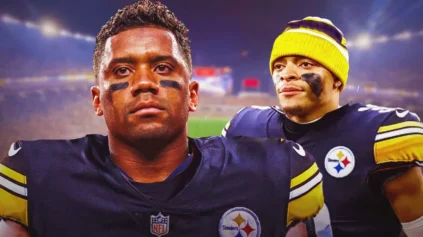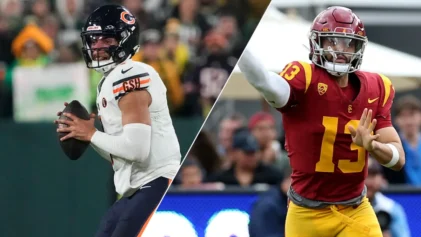A rule change submitted by the NFL rules committee that could change the way NFL running backs play has riled up Chicago Bears running back Matt Forte.
Via ESPN:
The new rule would penalize a runner 15-yards if he initiates contact with the crown of his helmet outside of the tackle box. Incidental contact with the crown of the helmet would not be a penalty.
In response, Forte took to Twitter to air his grievances.
The proposed rule change for running backs might be the most absurd suggestion of a rule change I've ever heard of.
— Matt Forte (@MattForte22) March 17, 2013
In order to lower ur shoulder u obviously have to lower ur head. It's a way of protecting ur self from a tackler and a way to break tackles
— Matt Forte (@MattForte22) March 17, 2013
U can't change the instinctive nature of running the football.
— Matt Forte (@MattForte22) March 17, 2013
Marshall Faulk joined Matt Forte's opposition to the potential rule change.
A RB can't lead with his helmet. A lot of chins are about to get busted.
— Marshall Faulk (@marshallfaulk) March 18, 2013
Goodell's NFL is aiming to do everything in his its power to combat the stigma traumatic brain injuries have brandished his league with. Just this weekend, ex-Eagles running back Brian Westbrook revealed that at age 33, he is already experiencing severe short-term memory loss. Perhaps there is a silent majority of players who support the NFL's cause, but for the most part today's players believe the game is safe enough. Along, with the fears over long-term player health, Goodell reportedly has fears of a player dying on the field and is taking every measure he can to prevent this from occurring. However, it appears this rules may be more detrimental to running backs than it may be helpful.
The advent of spread option offenses couple with athletic quarterbacks have phased out tailbacks. Feature backs are a dying breed in the NFL and this rule would further restrict the ability of power backs to impose their will on defenders. This rule change could make running backs less effective than they are today and expedite the NFL's evolution into a full fledged passing league. It's also understandable where both sides of the debate over player safety stand on this rule, in particular. Not only is it difficult to determine incidental content from premeditated contact, but judging by Faulk quickly echoing Forte's opinion, and the absence of blowback from fellow players, it's clear that most players of his ilk would agree that this proposed rule goes too far.


